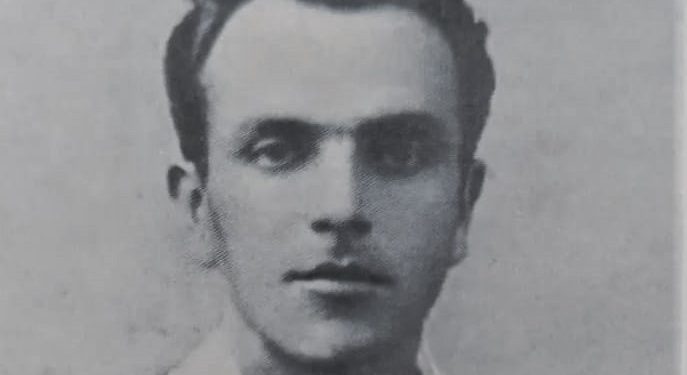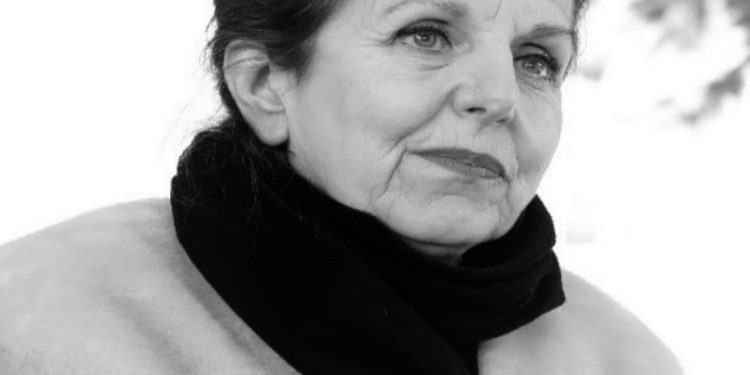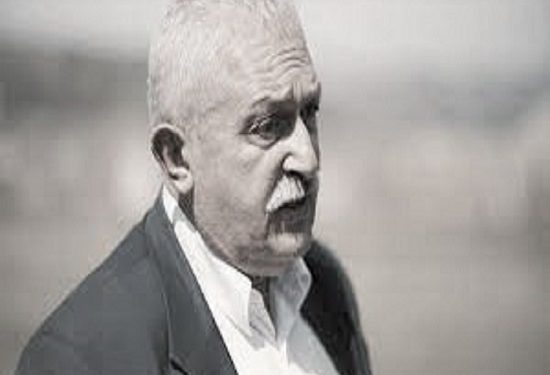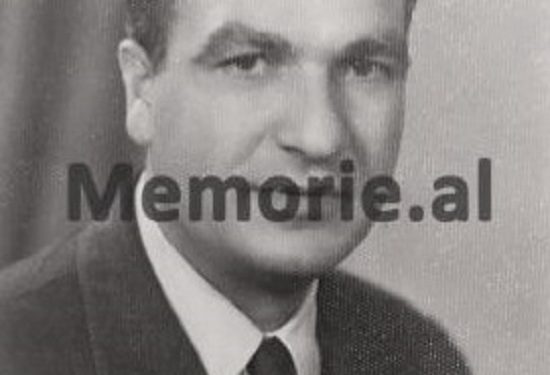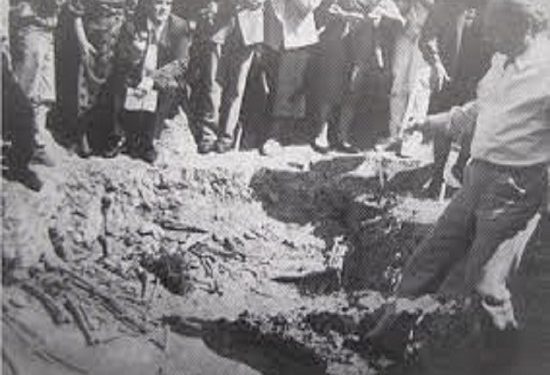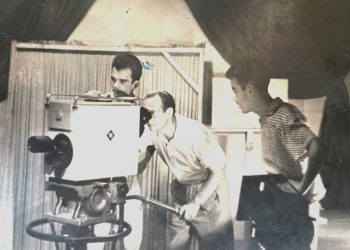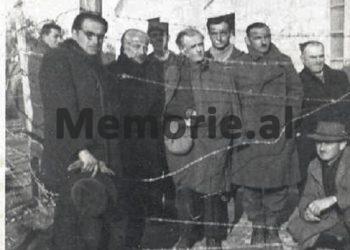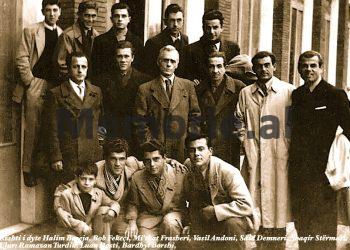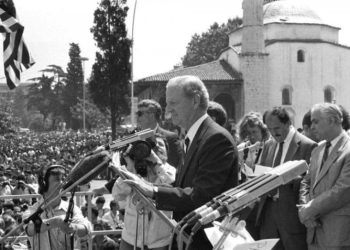Interviewer: Marcel Hila
Second part
Memorie.al / Missing: Galip Hatibi. Convicts: Father, Rasim Hatibi, interned while he was alive. His wife, Asamble Hatibi, sentenced to prison and exiled. The son, Durim Hatibi, persecuted as a person with a bad biography Galip Hatibi, born in 1920, originally from Skopje. He worked as a secretary in the Ministry of Interior, but left resigning to move to the field of sports, as an organizer of national and international sports activities. He knew several foreign languages: Serbo-Croatian, Italian, French, English, and German. On September 25, 1946, at the age of 26, he was arrested by the State Security at midnight after coming out of a long meeting with sports leaders.
Continued from the previous issue
Mrs. Hatibi, in what year was this testimony taken?
This is ’92. He is also one of the lawyers Koço Dilo himself, in ’92. He says that in ’47, in September, when he was arrested by the State Security authorities, he was detained for several months, in the State Security building (Leaf House) located on “4 Shkurti” street. . There he had the good fortune to meet Galip Hatib, who was kept isolated in one of the back basements of the building, in miserable condition. He later learned that he had been executed and burned at the stake in ’48.
Did you get the latest information about Galip in ’92? From 1948 to 1992, did you hear any other news?
Nothing. And I myself, I have often thought, I have not heard from my mother-in-law, but I have thought that who knows how many years she has hoped…?!
There have been other cases when people hoped that maybe one day they would find their relatives alive. In one case, their father had been shot since ‘62; while the family until ‘90 hoped that one day he would return. After the ’90s, they found the sentence of sentencing and shooting.
Though I said, that she did not accept that he had left the country, had fled, but still, deep down in her heart, she lived with the hope that she might be alive somewhere, in some place.
Legends have been raised about this man who may have escaped, but there are two other pieces of information that show the opposite. I have a question that does not refer to you, but to your family experience: If they had met the killers by chance, those who disappeared and killed their loved one, what would they have tried, what would they have done?
Unfortunately, I also lost my husband, the son who was born to them. It probably belonged to him, if he were alive. I do not think my mother-in-law would have taken physical revenge, absolutely not. Simply, she could have written many things, but she came out of prison sick, with neurosis, was afraid to go out, and never left the house
From the day he was released from prison, was he afraid of being arrested again? Who knows what she saw, horror…!
She never left the house, except two or three times to her own people, with the police.
Has he continued prison even at home?
Yes, she continued prison at home.
When was the mother-in-law separated from life?
In ’99.
How do you think she would react, or not? Has accepted that luck!
She has accepted it! Simply, she would talk a lot, vent her anger, I think, peacefully.
Were there any personal belongings of Galip Hatib, things through which, you remember that man?
I have letters that Galipi brought to his wife or family that his wife was only a friend at that time. From Bari prison, he addressed his family with a lot of love, with a lot of dedication. The problem, as he himself says in those letters, was that he did not have a letter to write often and he wrote in such small letters. Here, these are the letters. There are even smaller ones. I think my mother-in-law should have left them somewhere, maybe with someone of her own, because I did not see these at home while my mother-in-law was in prison, otherwise…!
Clearly, otherwise they would have taken it, they would have disappeared…! Maybe they brought you when democracy came?
Yes, I think I have not seen them. These have come back. I entered their house when my mother-in-law was in prison. She knew me when we had our 9-month-old daughter and we went for the first time to the women’s camp in Kosovo, Lushnja, to meet each other. It was tremendous emotion. That day…. (Cries) we went by taxi because the girl was 9 months old. It was a luxury for us to take a taxi, but we had no choice. My husband used to go by train and bicycle then, once every three or four months, to deliver food, in addition to those he mailed, dry food that we could deliver. My mother-in-law also smoked a cigarette and that was her main food, she said. I sent him a letter in two or three weeks.
… .I have it before my eyes: it was a long way, except for the iron door where the guard and meeting room was. Yes the camps, the buildings were about 400-500 m away further, I do not know exactly, but I know that what impressed me immensely, were all the other women watching me from afar. It was extremely touching.
You went as a bride with your baby, that is, with her 9-month-old granddaughter, who saw her for the first time…?
She me, and I her. I had never known him! I did not get married, I ran away from home so as not to burden my family, after she was arrested. I already knew my husband and we made the connection. In those conditions, people, knowing my connection, said to me “Leave, leave, because people have left him married with children, you only have a friend”!, but I did not leave him and so…!
Being labeled a “bad biographer”, how did people treat you?
We were taken away, on the outskirts of Tirana, with my husband. Luckily, where they took us, there were a lot of people who were like convicts and took them there to work. They stayed closer to us and behaved well. They generally behaved well, in terms of getting closer to us, but they were the people, not the people in charge, i.e. the bosses. Boss, no! We were always persecuted! They did not give us the category that we were workers, because when you got the category, you got a higher salary.
In what ways have you been excluded, removed, and isolated?
One way was this: branching out. They took us to work where it took an hour and a quarter to get home, in three shifts. I worked with my husband.
In what country did you work?
At the granite enrichment plant. Finally, we worked there, then my husband was taken to the Tractor Factory, until democracy came, then it was evaluated differently. There he worked three shifts, I was still on three shifts and, since we became kids, he also did my third shift so I would not go out on three shifts. I told you that they did not put us in categories when we filled the time to search for categories above, because they would give us a higher salary. We needed that salary to live and keep the mother-in-law in prison, because there, with stiver juice, she could not hold her soul, plus she was also a pensioner, that 3 months before she retired, she was arrested and he could not work as other women did, forcing them to work in agriculture there. Those who worked got meat once a month it seems to me, I do not know what kind of meat it was, but my mother-in-law said that, they got food, something else.
Has physical or psychological violence been used against you or your family, children, husband, including your mother-in-law?
Physically I do not know, but psychological yes! From the beginning, when I got married, when I went home, my husband did not allow me to talk at home, because we knew we had eavesdroppers. We had a private house with a patio all around and at night, in the dark, they might even come to our window. We would write to each other when we had something to say and then we would erase the letter. Then, when we went out together, especially when we went out together, I knew, my husband often turned his head, even though he did not want to do this in front of me, but he knew we had someone to accompany us.
Were you being watched?
Yes! Even when we worked together in the beginning, before the baby was born, in that factory I told you about, that factory was on the hill, and the person who accompanied us to work stayed under the trees in the shade, until we finished the shift, the day it seemed, then at night, when my husband came and I was home – he was coming from the second shift and I could not wait for him to come, it was 12.00, that at 11.00, he left work, at 12:30 he arrived home, even that to find warm things, I waited for him to undress and come to eat, – he was often late to the room. When I went, I saw that he was looking out of the curtain with the light off, whether that person had escaped or not. This is psychological violence. We lived that period with this, then others and others…!
Did you feel your life as a curse, as a fall into the abyss?
Then, to answer this in just two lines, I will quote a letter from the Companions of Patience, an expression he used frequently and which answers your question: “Laugh, for I cannot cry!” So Duri often said, Patience, and this was, perhaps, the narrative emblem of the way he lived and survived the days of this world.
He was an athlete with Tirana, he played until ’71, and then he gave up, because for many reasons, although he was an extraordinary talent, they did not give him the opportunity. Someone helped him to do a school … he did it all well, even with 7 foreign languages, all taught self-taught.
He did not know Duri’s father. His mother raised him and he was very quiet. I think he sought it, despite not feeling close to his father, he sought it with his own soul and with all that he has done to survive for himself, for his mother, and for the way how he chose to live life in those conditions.
Were there moments when he expressed that he missed his father, such as, in marriage or for the birth of children, or even in other moments?
Duri was very silent in nature, because, as I think, – and this is the logic of his life, – he grew up in those conditions that, as a child from his mother, he knew the reality, so he was restrained for many things. , but has been really very intelligent. To be able to learn languages self-taught, in those conditions when we worked there with stones, because with stones was the factory…! Even if you were to look at Durin where he was working with shovels and stones, at the moment they chose to place him in a place where he would take the shovel and fill the elevator with stones going to be ground in the mill, he had a book hidden there, under rags and cloth bags, which he read all the time.
How did you, as a family, react to the fall of communism?
I was very scared, except for the joy and enthusiasm, because I could not find Durin. I went out and looked for him. I was afraid that, out of all that enthusiasm of the people, he would not restrain himself, Duri would not restrain himself. It was truly a very emotional day the day September fell.
It is about an era, more than a day. When democracy came, did you formally address anyone about the body and fate of your father-in-law, Mr. Galip?
Duri did it himself, asked the Ministry of Interior for the file and they told him that they could not find it, there is no file.
Do you hope that the bones of your relative can be found?
I would like, but I have no hope, knowing many things and that he is burned. My mother-in-law left a will before she died that, in her grave, the picture of Galip should be placed, and at the grave of my mother-in-law, if you will look, there are both pictures, and the name of Galip, as if they were both together, but, in fact, in the grave is only my mother-in-law. At least have a grave that bears his name.
I have never heard this before in my life! When do you think this story closes?
I do not know if the body will be found, but with what has been heard back, I do not hope it will be found…!
So you are on the verge of dying hope?
Yes Yes!
Madam, thank you so much for the interview!
Thank you for giving me the opportunity to say! This is a very small part, actually.
You have made a confession from your family sources, but you have brought data for a monstrous time, how people were burned, how they were destroyed. It is a crime archeology that comes out little by little. You help society a lot, so it’s us to thank you again!
Thank you.
Thank you. Memorie.al




